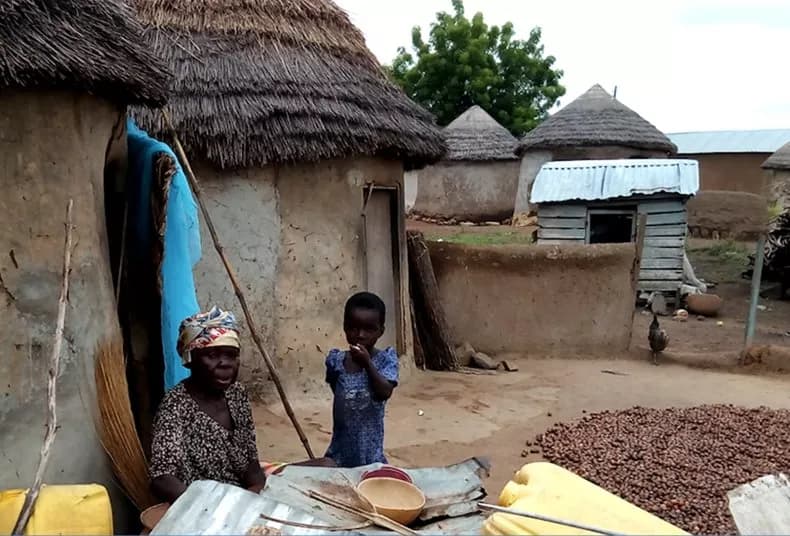YAOUNDÉ, Cameroon – A Catholic bishop in Ghana has called on Catholics in the African nation to go beyond simply providing charity to individuals accused of witchcraft, and to try to change the conditions that lead women accused of the practice to seek safety in so-called “witches’ camps.”
Bishop Alfred Agyenta of Navrongo-Bolgatanga was speaking during an Oct. 26 homily to mark the 25th anniversary climax of the Diocese of Yendi in northeastern Ghana, near the border with Benin.
Agyenta emphasized the need to work towards dismantling the systemic factors that led to the establishment of these camps in the first place.
“Let us pray and work hard towards that day when we will move beyond doing charity to these women to dismantling the system that has produced these camps,” he said.
According to Global Atlas, a “witch camp” is a refuge for women accused of witchcraft. Ghana contains seven camps, housing over 1,000 women, some of which are believed to be at least 100 years old.
Many of the women who seek refuge in the camps are widows accused by relatives of causing their husbands’ deaths through witchcraft. Experts say these accusations often are driven by greed, as labeling the widows as witches allows the accusers to seize the deceased husbands’ possessions.
Additionally, mentally ill women, and others deemed outcast for one reason or another, also reside in these camps. The inhabitants generally lack access to government services and basic amenities.
The Sanneh Institute, a scholarly community dedicated to equipping and resourcing religious leaders, scholars, academic institutions and wider African society, has documented conditions at the camps, noting in a June 2021 report that “virtually no regular services are provided by the government or its agencies, and there are few health or educational facilities.”
The institute said women accused of witchcraft are frequently subject to various forms of abuse: Rape, monetary exploitation, verbal and emotional abuse, diversion of relief aid, and forced labor with little or no pay.
It said nearly all the women who arrive in the camps don’t want to stay, but returning home is not an option. They could be re-accused if someone falls sick or dies, and the fear of stigma, as well as resentment against family members who accused them in the first place, have all made it difficult for most of them to leave.
Agyenta described the camps as “a scar on the conscience of all Ghanaians.”
Ghana has however taken steps to address the scourge. On July 28, 2023, the country’s parliament passed a bill making it illegal to accuse or label anyone a witch. The law came after a 90-year-old woman Akua Denteh, was publicly lynched in July 2020.
It sparked a campaign by human rights organizations and Churches, calling for the passage of an Anti-Witchcraft Law. On August 4, 2020, the Sanneh Institute officially petitioned parliament, urging the passage of legislation to criminalize witchcraft accusations. It was eventually passed in 2023.
“The law will provide a legal framework to prosecute offenders… and give confidence to victims… to reintegrate into their communities and unite with their families,” said Kwame Anyimadu-Antwi, the Chairman of the Committee on Constitutional, Legal and Parliamentary Affairs. Despite its passage, implementation has been slow.
This has also irked the Ghanaian Bishop, who expressed outrage over the stalled implementation.
“Fair-minded Ghanaians and, indeed, all Christians are disappointed with the stalling of this bill, which sought to bring relief to the many vulnerable women languishing in the so-called camps,” the cleric said.
“It is very sad to learn that financial considerations relating to the passage of the bill have been placed over and above the need to restore and protect the dignity of our mothers, grandmothers, and sisters who are made to feel like second-class citizens in their own country,” he said.
The cleric questioned the moral priorities of those in power and wondered if they would have acted the same way “if they had a mother, a sister, or a grandmother sitting in one of these camps.”
“How can we continue to look on in desperation when the Gospel message is so loud and clear on the inviolability of the dignity of every human being?” the bishop asked.
He recognized the role of the Church in the effort to do away with the practice of witchcraft.
“Looking back to the past with gratitude, we have seen how the power and light of the Gospel have made inroads into every facet of society, challenging cultural practices such as the ‘Spirit child’ phenomenon and the belief and practice of witchcraft,” he said.
Across Africa, accusations of witchcraft are rife, and the African Union has recognized it as a problem. In March 2022, the continental body issued guidelines on how member states could deal with the long-standing problem often shrouded in silence.
In the last decade, the United Nations has catalogued some 20,000 cases of violence tied to witchcraft across 60 countries worldwide.
The African Union guidelines encompass a diverse set of measures designed to strengthen protocols already in place within African states to advance gender equality, protect children, and uphold human rights.
In eight African countries, there are laws criminalizing accusations of witchcraft against children or people with albinism, who are frequently targets for suspicions.














